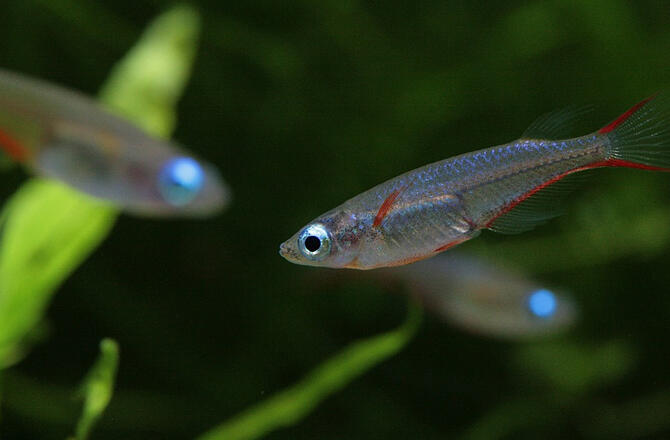
Sexually inexperienced, or naïve, male ricefish were found to actively court their mating partners after several mating acts with a particular female, and female ricefish were found to be receptive to mating after several acts with inexperienced males, creating a truly compatible relationship. The discovery was made by a group led by doctoral student Masahiro Daimon and Professor Hideaki Takeuchi of the Graduate School of Life Sciences, Tohoku University. They found that the expression of a group of thyroid hormone-related genes was increased in the brains of males after several mating experiences, suggesting that thyroid hormones may be involved in mating experience-dependent behavioral changes. The group's findings were published in Scientific Reports.
It is believed that in most animal species, males do not actively select familiar females with whom they have mated with in the past as sexual partners in order to increase their reproductive opportunities. Male ricefish also did not have preferences for familiar females, and mating experience was thought to have no effect on preference for the opposite sex.
In their research, the group prepared male ricefish that had been reared exclusively with males since juvenile age and had no mating experience (naïve ricefish) and conducted a mating behavior experiment to test how their behavior changed when they repeatedly engaged in mating behavior with a particular female. They isolated the males and females prior to the experiment, and males and females were placed in the same tank each morning to observe their behavior. The researchers concluded that the shorter the time between the male and female meeting and the male's first courtship, the higher the male's courtship activity, while the shorter the time between the male's first courtship and the female's acceptance of courtship, the higher the female's sexual receptivity.
They discovered that multiple mating experiences markedly reduced the time until the end of mating behavior and increased both male courtship activity and female sexual receptivity.
Next, to test whether males remember and identify their first sexual partner, they conducted a behavioral experiment in which they switched partners during the experiment. The results showed that the time to the end of mating behavior did not vary across multiple sexual experiences when the pairs were switched in the middle of the session. They found that naïve male ricefish and their first mating partner had enhanced mating activity between a specific pair, namely, that they were in a state of compatibility. Furthermore, when the researchers conducted the same experiment with male ricefish with seven or more mating experiences (experienced ricefish), neither male courtship activity nor female sexual receptivity increased.
Using next-generation sequencing, they identified a group of genes whose expression fluctuated after two mating experiences in the brains of naïve male ricefish and found that the expression levels of genes encoding a hormone that promotes thyroid hormone secretion (TSH) and an enzyme that converts thyroid hormone from an inactive to an active form (DIO2) were increased.
The phenomenon that mating behavior is altered depending on mating experience has been reported in many animals from fruit flies to mice. On the other hand, although thyroid hormones have long been known to be important for body development (growth) and metabolism, there are no reports of thyroid hormones being activated in the male brain by mating experience. Future testing of the involvement of thyroid hormones will hopefully reveal the mechanism of mating experience-dependent behavioral change from basic research on ricefish.
Journal Information
Publication: Scientific Reports
Title: Mating experiences with the same partner enhanced mating activities of naïve male medaka fish.
DOI: 10.1038/s41598-022-23871-w
This article has been translated by JST with permission from The Science News Ltd. (https://sci-news.co.jp/). Unauthorized reproduction of the article and photographs is prohibited.




